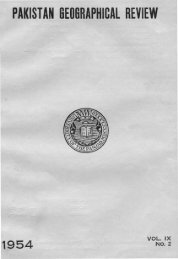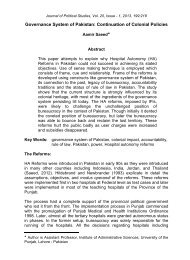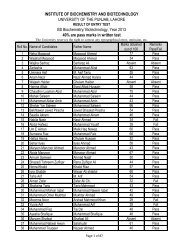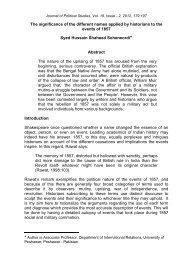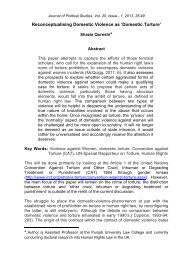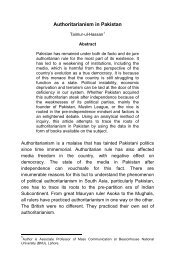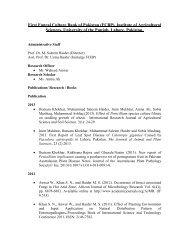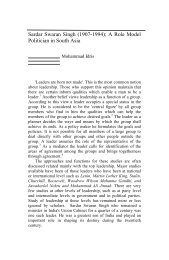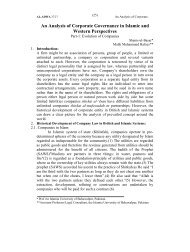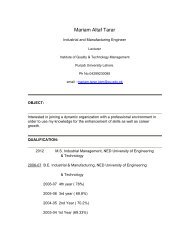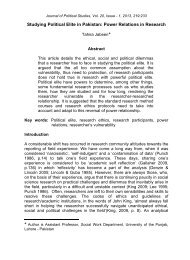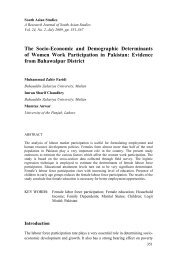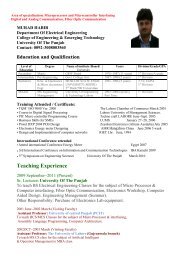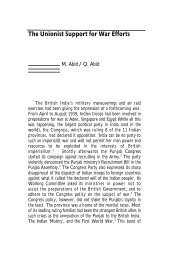Can Pakistan be a Secular State? - University of the Punjab
Can Pakistan be a Secular State? - University of the Punjab
Can Pakistan be a Secular State? - University of the Punjab
You also want an ePaper? Increase the reach of your titles
YUMPU automatically turns print PDFs into web optimized ePapers that Google loves.
Muhammad Imtiaz Zafar<br />
<strong>Can</strong> <strong>Pakistan</strong> <strong>be</strong><br />
over five thousand. <strong>Secular</strong>ism as a movement had <strong>be</strong>come a fact <strong>of</strong> some<br />
significance in <strong>the</strong> life <strong>of</strong> Victorian Britain (Royle E. 1994: 406-411). Charles<br />
Bradlaugh (1833 – 1891) is placed in a very significant and peculiar place in <strong>the</strong><br />
parliamentary history <strong>of</strong> Britain. He was time and again elected from Northampton<br />
but was not allowed to <strong>be</strong>come a mem<strong>be</strong>r <strong>of</strong> <strong>the</strong> House <strong>of</strong> Commons. In fact he<br />
refused to take <strong>the</strong> oath as it had no meaning for him. It gave him a status <strong>of</strong><br />
national celebrity, <strong>the</strong> personification <strong>of</strong> radicalism and symbol <strong>of</strong> popular<br />
democratic rights (Royle E. 1994: 414-415). George William Foote (1850 - 1915)<br />
follower <strong>of</strong> <strong>the</strong> secular thinking <strong>be</strong>gan a periodical Freethinker. It was known to<br />
<strong>be</strong> a scurrilous publication which attacked Christianity with bar<strong>be</strong>d wit and savage<br />
humor. Joss Mash ostensibly argues that Foote sought to ‘desacrilize’ <strong>the</strong> Bible<br />
through <strong>the</strong> use <strong>of</strong> literary weapons <strong>of</strong> sarcasm, satire and pr<strong>of</strong>ane image. This is<br />
painted as a project – part li<strong>be</strong>rtarian, part literary – to reduce <strong>the</strong> Bible merely to<br />
<strong>the</strong> status <strong>of</strong> a text (Nash D. 1999: 108).<br />
Long sixty’s; <strong>the</strong> hallmark <strong>of</strong> secularization in Britain produced a most<br />
controversial book <strong>of</strong> li<strong>be</strong>ral <strong>the</strong>ology by John Robinson, <strong>the</strong> Anglican Bishop <strong>of</strong><br />
Woolwich. Honest to God published in 1963 placed God within humans, not<br />
outside <strong>of</strong> <strong>the</strong>m or <strong>the</strong>ir world, with Christianity to <strong>be</strong> understood in <strong>the</strong> form <strong>of</strong> a<br />
‘naturalism’ ra<strong>the</strong>r than a ‘supernaturalism’. This heretical book, as some saw,<br />
descri<strong>be</strong>d <strong>the</strong> notion <strong>of</strong> heaven ‘as <strong>the</strong> greatest obstacle to an intelligent faith’ and<br />
emphasized God in our loving and ethical actions ra<strong>the</strong>r than in <strong>the</strong> next world and<br />
its promises. Dr Michael Ramsey, <strong>the</strong> Archbishop <strong>of</strong> <strong>Can</strong>terbury commented on<br />
Robinson’s imagery <strong>of</strong> God as ‘utterly wrong’ and wrote ‘strange, difficult and<br />
revolutionary’ in his pamphlet Image Old and New (Brown C. 2006: 232-233).<br />
Britain is a Religious Country<br />
Having said all about <strong>the</strong> secularization <strong>of</strong> Britain, explicit in <strong>the</strong> decline <strong>of</strong><br />
Church mem<strong>be</strong>rship and people’s distancing from <strong>the</strong> practice <strong>of</strong> religious rituals<br />
in life cycle, it is not out <strong>of</strong> place to say that many symptoms and indicators still<br />
depict <strong>the</strong> ‘survivability’ <strong>of</strong> Christianity in England. Religious pluralism and <strong>the</strong><br />
coming <strong>of</strong> Eastern religions discourage one to proclaim <strong>the</strong> loosing significance <strong>of</strong><br />
<strong>be</strong>lief in social life <strong>of</strong> people. It is also true <strong>of</strong> Christian’s parts <strong>of</strong> Christendom<br />
who are settled here especially from Africa. Even <strong>the</strong> debate on <strong>the</strong> ‘dynamics <strong>of</strong><br />
implicit religion’ is opening new avenues to sense <strong>the</strong> existence <strong>of</strong> religion in<br />
British culture. Lewis Christopher writes that Edward Bailey, one <strong>of</strong> <strong>the</strong> main<br />
conceiver <strong>of</strong> <strong>the</strong> idea <strong>of</strong> implicit religion, in his article “Implicit Religion in<br />
Contemporary Society”, 1997 and <strong>the</strong> book Implicit Religion: An Introduction<br />
1998 refers to ‘implicit religion’ as those aspects <strong>of</strong> ordinary life, which seem to<br />
contain an inherently religious element within <strong>the</strong>m, whe<strong>the</strong>r or not <strong>the</strong>y are<br />
expressed in ways that are traditionally descri<strong>be</strong>d as ‘religious’. Bailey defines it<br />
in three ways, as ‘commitment’; ‘integrating foci’; and ‘intensive concerns with<br />
extensive effects’ (Bailey E. 2005). Similarly Grace Davie pleads that “religion is<br />
175



